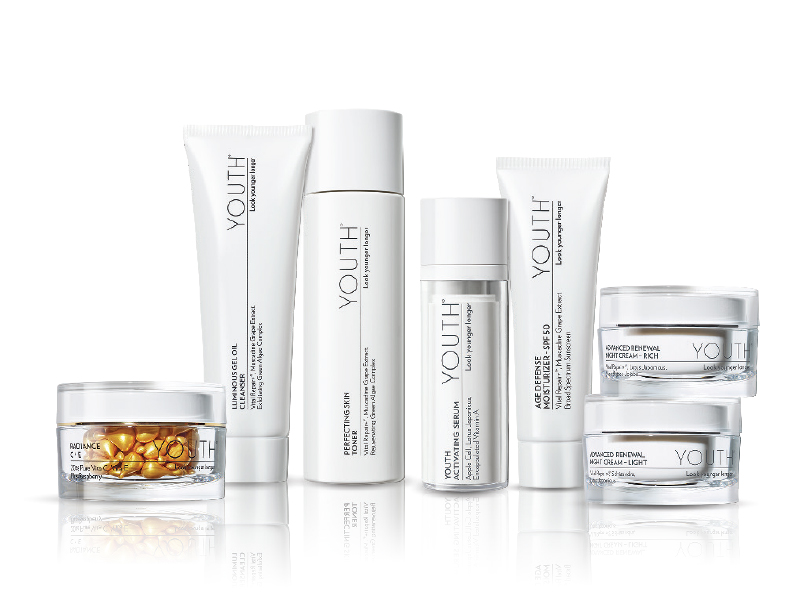Be Beautiful From Within
BE BEAUTIFUL from Within
Gorgeous! What does it take for her skin to be that gorgeous, you wonder. Your skin is a reflection of your inner being. Equally important as choosing the right jar of cream to treat your skin condition, what you feed yourself on a daily basis plays a vital role in your skin health. Consuming the right nutrients will not only enhance your natural beauty but also gives the skin a more radiant, healthy and youthful glow. Discover the 5 essential nutrients to enhance your natural beauty.

SOY PROTEIN
Build Healthy Skin
Sufficient intake of protein is important to:
- Provide essential amino acids (which are not made in your body) to optimise skin’s function.
- Repair and generate new skin cells and tissues.
- Produce healthy hormones and vital enzymes for skin.
- Support production of amino acid glutathione that help to shield skin cells against sun damage.1
- Stimulate production of hyaluronic acid to bind and retain water in skin cells, ensuring optimal hydration and moisture in skin.2
- Inhibit degradation process of collagen and elastin for reduction of wrinkles, discolouration and improve overall skin appearance.3
- Improve skin texture and lighten skin pigmentation3 for radiant, glowing skin.

POLYPHENOLS
Internal UV Shield
Polyphenols shield your skin from harmful UV rays and free radicals attack4. It:
- Halts breakdown of collagen and elastin, boosting collagen production.5
- Reduces inflammation.6
- Smoothens fine lines and wrinkles.6
- Reduces formation of pigmentation.
- Promotes firmer and younger looking skin.6

B VITAMINS
Bye-Bye Stress, Hello Beautiful!
B Vitamins is known as an “anti-stress” vitamin. But do you know they are essential for skin, hair and nail health too? It:
- Speeds up wound healing.7
- Reduce spread of acne and facial blemishes.8
- Protect skin from UV damage, reduce risk of developing skin cancer.9
- Support red blood cell formation10, which delivers oxygen and nutrients to the scalp and hair follicles, aiding hair growth.
- Improve hair flexibility, strength and shine, thus reducing hair graying and hair loss.
- Build and repair nail tissue, strengthening them so they do not break or chip easily.

VITAMIN C
Antioxidant Protection
Regular intake of vitamin C helps to:
- Defend against free radicals.11
- Protect collagen from oxidative damage.
- Promote collagen synthesis and skin regeneration.11,12
- Reduce appearance of wrinkles, soothe dry and rough skin.13
- Act as a depigmenting and anti-inflammatory agent.14
- Aid in wound healing.11
- Protect against UV rays.14
- Promote iron absorption, necessary to keep our hair strong and healthy.
- Maintain integrity of nails.

COLLAGEN
Support Firmer Skin
Delay signs of ageing and start taking collagen now to:
- Restore natural deterioration of collagen15, thus experience better skin elasticity16.
- Enjoy supple, firmer skin.16
- Improve skin moisture15, reduce facial dryness and flakiness.
- Minimize appearance of pores, fine lines and wrinkles.17
- Reduce scar visibility.17
- Help bust firming and lifting.
- Support in producing keratin for stronger hair.
- Reduce brittle nails by as much as 43% with daily consumption.
References:
1. Poljšak, Borut, and Raja Dahmane. “Free radicals and extrinsic skin aging.” Dermatology research and practice 2012 (2012). 2. Miyazaki, K., Hanamizu, T., Iizuka, R., & Chiba, K. (2002). Genistein and daidzein stimulate hyaluronic acid production in transformed human keratinocyte culture and hairless mouse skin. Skin Pharmacology and Physiology, 15(3), 175-183. 3. Draelos, Z. D., Blair, R., & Tabor, A. (2007). Oral soy supplementation and dermatology. Cosmetic Dermatology-Cedar Knolls, 20(4), 202-207. 4. Zhou, Y., Zheng, J., Li, Y., Xu, D. P., Li, S., Chen, Y. M., & Li, H. B. (2016). Natural Polyphenols for Prevention and Treatment of Cancer. Nutrients, 8(8), 515. doi:10.3390/nu8080515. 5. Afaq, F., & Katiyar, S. K. (2011). Polyphenols: skin photoprotection and inhibition of photocarcinogenesis. Mini reviews in medicinal chemistry, 11(14), 1200–1215. 6. Joi A. Nichols, S. K. (2010). Skin photoprotection by natural polyphenols: anti-inflammatory, antioxidant and DNA repair mechanisms. Archives of Dermatological Research, 71-83. 7. Neiva, R. F., Al-Shammari, K., Nociti Jr, F. H., Soehren, S., & Wang, H. L. (2005). Effects of vitamin-B complex supplementation on periodontal wound healing. Journal of periodontology, 76(7), 1084-1091. 8. Yang, M., Moclair, B., Hatcher, V., Kaminetsky, J., Mekas, M., Chapas, A., & Capodice, J. (2014). A randomized, double-blind, placebo-controlled study of a novel pantothenic acid-based dietary supplement in subjects with mild to moderate facial acne. Dermatology and therapy, 4(1), 93-101. 9. Park, S. M., Li, T., Wu, S., Li, W. Q., Weinstock, M., Qureshi, A. A., & Cho, E. (2017). Niacin intake and risk of skin cancer in US women and men. International journal of cancer, 140(9), 2023-2031. 10. Institute of Medicine (1998). Food and Nutrition Board. Dietary Reference Intakes: Thiamin, Riboflavin, Niacin, Vitamin B6, Folate, Cobalamin. Pantothenic Acid, Biotin, and Choline. Washington, DC: National Academy Press. 11. Catani MV, Savini I, Rossi A, Melino G, Avigliano L. Biological role of vitamin C in keratinocytes. Nutr Rev 2005;63:81–90. 12. Wolfgang Ko, Jean Krutmann. 2008. Protection from Sunburn with β-Carotene—A Meta-analysis. Photochemistry and Photobiology. 84: 284–288. 13. Cosgrove MC, Franco OH, Granger SP, Murray PG, Mayes AE. Dietary nutrient intakes and skin-aging appearance among middle-aged American women. AmJ Clin Nutr. 2007;86(4):1225-1231. 14. Telang, P. S. (2013). Vitamin C in dermatology. Indian dermatology online journal, 4(2), 143. 15. Fujimoto Y et al. (2007). A Study on the Usefulness of Orally Administered Collagen Peptides Derived from Edible Marine Fish Scales on Human Skin and Hair. Fragrance Journal, p75-79. 16. Porksch E, Segger D, Degwert J, Schunck M, Zague V, Oesser S. Oral supplementation of specific collagen peptides has beneficial effects on human skin physiology: a double-blind, placebo-controlled study. Skin Pharmacol Physiol. 2014;27(1):47-55. 17. Matthias CA, Fernandes D, Kolokythas P, Kaplan H, Vogt P. Percutaneous collagen induction therapy: an alternative treatment for scars, wrinkles, and skin laxity. Plastic Reconstruct Surg. 2008;121(4):1421-1429.







